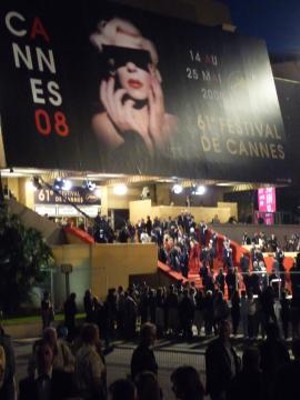The 61st Cannes Film Festival Awards its Favorites

The 61st Cannes Film Festival Awards its Favorites
By Cole Smithey (533 words)
CANNES, France May 25. At this year's Cannes Film Festival, the jury, presided over by Sean Penn, awarded the Palme d'Or to Laurent Cantet for his heavily work-shopped film about a French junior high school teacher in a tough neighborhood, whose teaching style is challenged by his difficult students.
The Palme d'Or award in the Court Metrages (Shorts Films) category went to director Marian Crisan for "Megatron," about a young Romanian boy whose single mother takes him, for his eighth birthday, to Bucharest where his father lives.
The Camera d'Or (First Film Prize) went to director Steve McQueen (no not that one) for "Hunger," about Bobby Sands' 1981 hunger strike in Northern Ireland's Maze Prison.
The Prix Un Certain Regard went to director Sergey Dvortsevoy for "Tulpan," about a young Kazakh naval officer who returns to the steppe to live a nomadic life.
The Prix Du Scenario (Best Screenplay) went to Luc and Jean-Pierre Dardenne for "Lorna's Silence," about a young Albanian woman (Arta Dobroshi) in cahoots with Fabio, a Belgian mobster, to make money so she can open a snack bar with her boyfriend. Lorna suffers through a fraud marriage to Claudy (well played by Jeremie Renier), a junkie that Fabio plans to kill in order to put Lorna in another sham marriage, this time to a rich Russian. If the plot sounds convoluted it doesn't impede an inevitable flood of surprising physical and emotional responses from the poker-faced Lorna. "Lorna's Silence" was one of the strongest films in competition.
The Prix Du La Mise En Scene award (Best Director) went to Nuri Bilge Ceylan for "Three Monkeys," about a father, mother, and son caught in a web of corruption, betrayal, and murder.
The Prix Du Masculine (Best Actor Prize) went to Benicio Del Toro for Steven Soderbergh's unconventional two-for-one Che Guevara biopic "Che."
"The Argentine" begins with Che's famous 1964 speech at the United Nations, and finishes with Batista's overthrow at the hands of Che's well-organized guerilla troops. The second half "Guerilla" picks up after Che's lost year in Africa when he slipped into Bolivia to help lead a doomed revolution. Problematically, the two films are scheduled to be released separately, drawing into question tonal differences between them. Soderbergh doesn't attempt to consolidate the story of Guevara's life, but rather to concentrate on the way the rebel leader attempted to build on his success in Cuba to spread revolution around the world.
The Prix Du Feminine (Best Actress Prize) went to Sandra Corveloni for her performance in Walter Salles' and Daniela Thomas' "Linha de Passe," about four brothers attempting to break out of limited opportunities in Sao Paulo.
The honors for the Grand Prix (Grand Prize) went to Matteo Garrone's "Gomorra," based on Roberto Saviano's tell-all mafia expose. Director Matteo Garrone weaves together five stories of mob-related corruption sucking dry the provinces of Naples and Caserta. A tailor, enslaved to his occupation since childhood, two would-be teen gangsters, a pair of illicit toxic disposal contractors, and a young boy living in a drug-infested housing project, make up the indelible characters in this devastating picture of social collapse.
-30-

